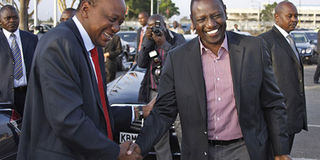For top jobs, Jubilee forgot youth again

President Uhuru Kenyatta and Deputy President William Ruto at the Jomo Kenyatta International Airport. The Presidency spent Sh838 million on buying new motor vehicles, according to a new report by the Controller of Budget. FILE PHOTO |
What you need to know:
- Rewarding cronies and politicians will only benefit the old guard who have enjoyed the system’s patronage for years.
- Today, young people aged between 18 and 34 account for 40 per cent of the population.
- The government’s employment policy should reflect this.
Although the Jubilee Government has been praised for empowering the youth through various initiatives, the same cannot be said about appointments to crucial positions, or the results those initiatives have brought.
The recent appointments to fill diplomatic positions, just as those made last year when President Kenyatta and his deputy formed the government, left out the youth and were, therefore, very disappointing.
Although the two leaders have maintained they value the youth for their productivity in providing services, they do not appreciate that their engagement, based on the history of this country requires focused affirmative action.
Rewarding cronies and politicians will only benefit the old guard who have enjoyed the system’s patronage for years.
With each failure to include the youth in crucial decision-making positions, it becomes clear the government is losing focus that will cost it politically when this big constituency revolts.
Jubilee campaigned on a platform of empowering the youth, which was reinforced significantly by the age of the President and his deputy. It was expected that the youth would play key roles in the new administration.
But immediately the two formed the government, they not only refused to appoint young people into the Cabinet or as principal secretaries and parastatal heads, it also refused to form an independent ministry for the youth.
TAKE MEASURES
Recently, Interior Cabinet Secretary Joseph ole Lenku recalled 10,000 police retirees to serve as agents of community policing. Does this demonstrate a coordinated approach to issues involving the youth considering that the Devolution ministry plans to reform the National Youth Service to play a role in the ‘nyumba kumi’ policing initiative?
There is a serious need to take measures to remedy the challenges facing the youth, which have persisted for many years. First, the youth must be involved in all economic policies and opportunities emerging in the public service.
Today, young people aged between 18 and 34 account for 40 per cent of the population. The government’s employment policy should reflect this.
SUPPORT PROGRAMMES
One of the excuse always given is that the youth lack experience. Government needs to put in place support programmes to give skills required for jobs in the public service.
The private sector offers a vital lesson that with an enabling environment, the future of this country lies in the hands of young people.
During the May, 2014 National Youth Convention, the Deputy President assured the youth that the government was committed to ensuring young people would be accorded more opportunities at all levels.
But, government actions seem to contradict its leaders’ public pronouncements.
And without a clear focus on how to address youth problems, which are ambiguously incorporated in various ministries and departments, all the initiatives the government has started will not yield the desired results.
The public tender system which requires that 30 per cent of the jobs go to the youth has failed, especially in remote counties, since those who mooted the idea failed to appreciate there were other dynamics obtaining, such as past marginalisation, as well as lack of information and finance.
Mr Obonyo is the external adviser on the UN Habitat’s Youth Advisory Board ([email protected])




